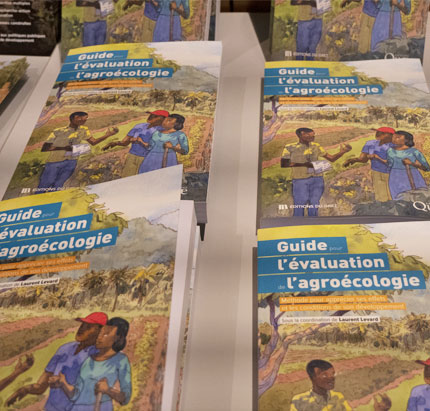-
Publié le : 20-03-2023
-
Type : Projet
On Monday, March 20, the guide "Evaluation of Agroecology" was presented at AFD's offices in Paris and via videoconference. This was an opportunity for the GTAE*, the author of this collaborative work, to explain the issues to which the evaluation and the proposed approach respond.
* Groupe de travail sur les Transitions Agro-Ecologiques (Working group on Agroecological Transitions): Agrisud, AVSF, GRET and CARI
For a convincing agroecology facing environmental and socio-economic challenges
As an introduction to the event, Mathieu Le Grix - Head of the Agriculture, Rural Development and Biodiversity Division at AFD - recalled the importance of the agroecological transition. Food and health security, resilience to climate change, fight against poverty and biodiversity loss... there is an urgent needs to shift the lines and much remains to be done. To do so, the scaling up of agroecology is necessary and this guide could contribute to this. By better evaluating the effects of agroecology and by providing common and intelligible references, the proof of its effectiveness would be more obvious and would make it easier to convince people to improve the means allocated to the development of sustainable agriculture.
"We hope that this guide will be an important contribution to the various methods of evaluating agroecology." M. Le Grix
A method based on the field experience of the members of the GTAE and their partners
Patrice Burger, Chairman of CARI and Administrator of Agrisud, ensured the animation and coordinated the interventions of the various authors of the guide.
First, Laurent Levard - Agronomist at Gret, specialized in economic and social sciences - presented the challenges of evaluation:
- For field actors, the method makes it possible to analyze the successes and failures of interventions and thus to improve the implementation of agricultural development projects.
- For public authorities, the solid references obtained will help them to set up policies and regulations for sustainable agricultural development in their territories.
- For farmers, the guide provides the means to analyze practices in order to improve activities.
Sylvain Deffontaines - Operations Director at Agrisud - then presented the main principles of the guide, based on two complementary situations of use: one-time evaluation at a given moment, to create references, and continuous monitoring and evaluation over time, to track changes. He explained that the results obtained make it possible to analyze the agro-environmental and socio-economic performance of agroecology, but also to identify the conditions necessary for its development.
"In order to deal with the diversity of situations, scales of analysis, themes, criteria, and indicators that generate great complexity, the proposed method is progressive so that each person can build an evaluation system that is adapted, relevant, and realistic with regard to the means at their disposal." S. Deffontaines

Katia Roesch - Program Officer specializing in agroecology, natural resource management and climate change for AVSF - then presented a concrete case of application of the approach. The example concerned the agro-environmental assessment of peri-oasis agrarian systems in Algeria. After presenting the key elements of the reference situation, she shared the results obtained according to the degree of agro-ecologization1 of the VSEs (Very Small family Enterprises).
Finally, a socio-economic evaluation case from the "Shared Sahelian Woodlands" project in Burkina Faso was presented. The observations clearly show the impact of agroecology on family income and food security. The VSEs that have strongly integrated agroecology into their production system are more resilient and generate much higher incomes than others.
1 see sheet 8 - page 292 of the guide.
The contribution of scientific partners to build a solid and recognized method
Since the beginning of the project, GTAE members have collaborated with several actors from the academic world: AgroParisTech, L'Institut Agro Montpellier, IRD and Cirad. This NGO-research consortium was welcomed by Hubert Cochet - Professor of comparative agriculture at AgroParisTech - for whom the challenge is to move from a "naive" defense of agroecology to something effective.
Eric Scopel, Director of the research unit "Agroecology and Sustainable Intensification of Annual Crops" (Aïda) at CIRAD, also testified of the interest of this new guide in advancing agroecology evaluation methods. It was also a challenge to produce a tool that combines scientific rigor and ease of use for field workers.

During the conclusion, Myriam Mackiewicz Houngue - Technical Director at AVSF - recalled that this guide project required 8 years of work and 17 people from NGOs and research were mobilized. The resulting guide proposes a demanding approach, based on both scientific rigor and field operationalization.
"For the GTAE members, agroecology is seen as a solution to climate change. [...] This guide can enable us to move from 'incantation' to 'demonstration', it may be ambitious but let's remember that the references of agroecology are based on technical, economic and social arguments." M. Mackiewicz Houngue
Finally, Emmanuelle Poirier-Magona - CSO Project Manager for Latin America, Agriculture at AFD - reaffirmed AFD's support to CSO initiatives in favor of the agro-ecological transition.
About a hundred people attended the event, which was broadcast live.
---
 This guide, co-published by Editions Quae and Gret, has been available since February 23 in paper or digital versions. It was presented at the Paris International Agricultural Show 2023 where it met a great success. Barely one month after its release, a little more than 160 copies have been sold and 1,290 downloads have been recorded on the Quae websites.
This guide, co-published by Editions Quae and Gret, has been available since February 23 in paper or digital versions. It was presented at the Paris International Agricultural Show 2023 where it met a great success. Barely one month after its release, a little more than 160 copies have been sold and 1,290 downloads have been recorded on the Quae websites.
Watch the video presentation of the guide (in French)


